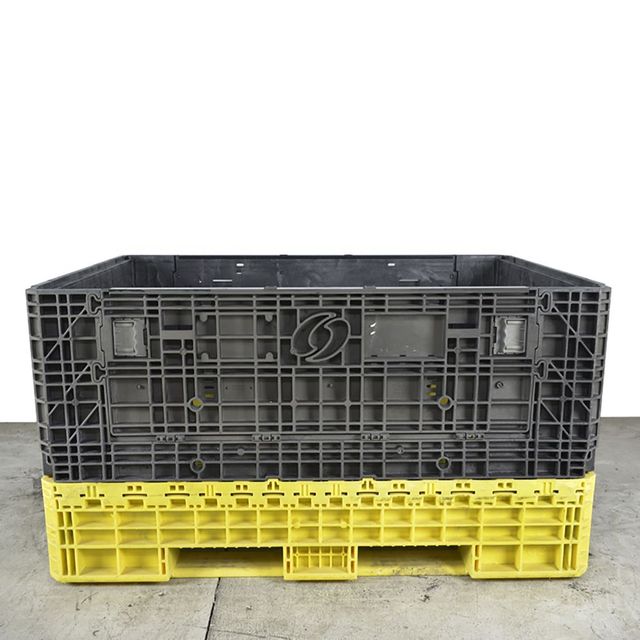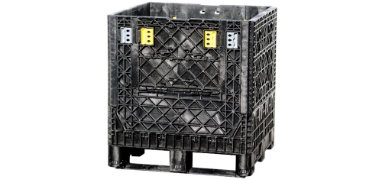Why Bulk Containers Are Essential for Lasting and Cost-Effective Transport
Mass containers play a vital function in contemporary logistics. They promote the efficient movement of big amounts of goods, therefore enhancing transportation procedures. This method not just reduces prices but additionally reduces environmental influence via reduced emissions and waste generation. As markets seek more lasting methods, the fostering of bulk containers is coming to be significantly considerable. What ramifications does this change hold for future logistics and supply chain monitoring?

The Benefits of Using Bulk Containers in Logistics
Mass containers change logistics by enhancing efficiency and sustainability. These containers permit for the transport of big quantities of goods in a single journey, considerably minimizing the variety of trips called for. This not only simplifies procedures but likewise lessens labor prices related to handling, filling, and dumping. In enhancement, mass containers are made to enhance area use within transport lorries, guaranteeing that even more items can be shipped concurrently.
The standardization of bulk containers likewise simplifies the logistics procedure. With consistent dimensions, they can be conveniently piled and kept, causing boosted stockroom monitoring. Bulk containers typically feature durable products that shield components from damages throughout transit, thus decreasing item loss and boosting general dependability. Therefore, organizations can experience enhanced supply chain efficiency, inevitably leading to raised success and consumer satisfaction. This combination of variables makes bulk containers a critical property in contemporary logistics.
Ecological Impact: Lowering Waste and Carbon Impact
As industries significantly prioritize sustainability, the adoption of mass containers has actually become a crucial technique for reducing waste and lowering carbon impacts. These containers minimize making use of packaging materials, such as boxes and plastic, therefore notably reducing total waste generation. By consolidating shipments, mass containers improve transport effectiveness, enabling more items to be carried per trip. This decrease in journeys directly associates with reduced greenhouse gas discharges, adding to a smaller carbon footprint.
Additionally, bulk containers can usually be recycled or recycled, better alleviating ecological influence. The resilience of these containers warranties they can stand up to several transport cycles, reducing the demand for single-use alternatives. refurbished bulk containers. By improving logistics and promoting efficient source usage, bulk containers not only sustain sustainable techniques yet also encourage markets to straighten with international ecological objectives. Ultimately, their application reflects a dedication to environmental stewardship and liable source monitoring
Price Financial Savings: Just How Mass Containers Lower Transportation Expenditures
While lots of firms seek ways to enhance their profits, making use of mass containers offers a substantial chance for decreasing transportation expenditures. Bulk containers optimize the quantity of goods transported, allowing companies to ship bigger quantities at the same time. This efficiency minimizes the number of journeys called for, straight reducing gas costs and reducing labor costs related to loading and discharging.
In addition, mass containers commonly feature streamlined styles that optimize area use within transportation vehicles. This indicates less empty spaces, bring about much more efficient use of available capacity. Additionally, the toughness of mass containers can reduce the risk of product damage during transit, lowering losses and making sure that more products get here undamaged.
Enhancing Supply Chain Effectiveness With Bulk Storage Solutions
Bulk storage space services play an important role in enhancing supply chain effectiveness by enhancing supply administration. By combining products right into less, bigger containers, organizations can significantly lower managing prices connected with constant transfers and processing. This structured strategy enables much better tracking and administration of supply, eventually bring about enhanced functional performance.
Streamlined Supply Management
Reliable stock management is necessary for maximizing supply chain operations, particularly when organizations embrace bulk storage space options. These options allow services to keep greater supply levels while lessening the regularity of replenishment. By consolidating materials into mass containers, firms can improve their stock procedures, minimizing the complexity connected with tracking several smaller packages. This approach promotes accurate supply matters and boosts forecasting precision, enabling more enlightened decision-making. Furthermore, mass storage space remedies streamline stockroom organization, making it much easier to locate and access products when needed. Consequently, organizations can attain a more efficient supply turn over rate, ultimately enhancing overall supply chain efficiency and minimizing the probability of stockouts or overstock circumstances.

Decreased Handling Prices
The application of bulk storage space remedies not only streamlines supply management but also significantly lowers taking care of costs across the supply chain. By combining products into mass containers, firms minimize the need for constant handling and transfer in between various storage and transport devices. This strategy lowers labor costs related to loading, unloading, and moving smaller bundles. Additionally, mass storage space reduces the frequency of deliveries, causing lower transportation costs and lowered fuel consumption. Consequently, organizations can optimize their logistics operations, enabling a more effective allocation of resources. Inevitably, decreased handling costs add to improved total supply chain performance, fostering an environment that supports both sustainability and financial feasibility.

Adaptability of Bulk Containers Throughout Numerous Industries
Many sectors have distinctive needs for transport and storage, mass containers have actually emerged as a versatile option that satisfies a large variety of requirements. These containers, ranging from huge bins to specialized containers, can suit diverse materials, including powders, fluids, and granules. In the agricultural industry, mass containers facilitate the transportation of plant foods and grains, while the food and beverage sector utilizes them for components and completed products. The chemical industry relies upon bulk containers for safely carrying harmful products, guaranteeing compliance with security regulations. Furthermore, building firms take advantage of mass containers for moving accumulations and various other materials. Their adaptability includes various modes of transportation, including ships, vehicles, and trains, enhancing logistical effectiveness. This adaptability not just streamlines procedures across different markets yet additionally promotes sustainability by decreasing product packaging waste and optimizing room en route. Mass containers play a vital duty in contemporary supply chain administration.
Future Patterns in Bulk Container Use and Sustainability
The future of mass container use is progressively formed by innovative products growth that enhances sustainability. Furthermore, automation in logistics promises to improve operations, decreasing waste and improving performance. Accepting round economic climate practices will certainly further reinvent just how bulk containers are developed, used, and recycled, promoting a much more sustainable transportation landscape.
Cutting-edge Materials Advancement
As sectors significantly focus on sustainability, innovative materials advancement wholesale containers emerges as a considerable consider improving eco-friendly transportation services. Makers article source and scientists are exploring eco-friendly plastics, recycled compounds, and light-weight steels to minimize environmental influence. These materials not only decrease waste but likewise boost gas performance by lowering the general weight of containers. In addition, innovations in clever materials, which can adapt to differing conditions, improve the toughness and performance of mass containers. The combination of these ingenious materials aligns with circular economy principles, promoting reuse and recycling. As the demand for sustainable practices grows, the advancement of such materials will play a vital function in shaping the future of bulk container use in logistics and transport.
Automation in Logistics
Substantial developments in automation are positioned to transform logistics and the application of bulk containers, enhancing sustainability in transport. Automated systems, consisting of drones and independent vehicles, are enhancing the motion of mass containers, minimizing the dependence on standard fuel-powered transportation. These modern technologies enhance routing and loading procedures, lessening vacant miles and boosting fuel efficiency. In addition, automated inventory management systems enhance tracking and monitoring of bulk containers, making sure better source allocation and minimized waste. The integration of the Web of Points (IoT) allows real-time information analysis, allowing positive decision-making that lines up with sustainability objectives. As automation proceeds to evolve, it is anticipated to drive even more developments wholesale container usage, inevitably sustaining even more lasting logistics methods and reducing the environmental impact of transportation.
Round Economic Situation Practices
Developments in automation are setting the stage for a much more incorporated approach to round economic climate techniques in the domain of mass container usage. As sectors increasingly accept sustainability, mass containers are being developed for long life and reusability. This shift not only lessens waste yet additionally enhances resource effectiveness. Firms are adopting approaches such as closed-loop systems, where made use of containers are accumulated, reconditioned, and reintroduced into the supply chain. Furthermore, smart innovations track container life process, facilitating far better administration and lowering ecological influence. The collaboration between manufacturers, logistics carriers, and end-users is essential in developing standards for sustainable container usage. used plastic containers. Future patterns indicate an expanding emphasis on products that are recyclable and biodegradable, further reinforcing the circular economic situation's principles in bulk transport

Often Asked Concerns
What Products Are Mass Containers Generally Made From?
Mass containers are generally built from sturdy materials such as high-density polyethylene, cardboard, steel, and light weight aluminum. These products supply toughness, protection, and convenience, making them ideal for moving numerous products in various industries effectively.
Exactly how Do I Select the Right Size Bulk Container?
Choosing the right size bulk container entails examining the volume of products to be moved, taking into consideration handling tools compatibility, and appraising storage area requirements. Correct size warranties efficiency in transport and lessens waste throughout shipment.
Are Mass Containers Reusable or Recyclable?
Mass containers are often reusable, made for numerous journeys, boosting sustainability. Several can additionally be reused, depending on the products utilized. Picking recyclable choices further sustains ecological goals and reduces waste in transportation methods.
What Security Laws Apply to Mass Container Transport?
Safety and security policies for mass container transport consist of compliance with the Division of Transportation guidelines, correct labeling of unsafe products, architectural honesty assessments, and adherence to weight limitations to assure safe handling and protect against crashes during transit.
How Can Services Change to Using Bulk Containers Properly?
Businesses can transform to bulk containers by examining existing logistics, training team on handling, buying appropriate tools, maximizing inventory management, and collaborating with distributors to ensure compatibility and efficiency throughout the supply chain.
As sectors progressively focus on sustainability, the fostering of mass containers has arised as a vital method for lowering waste and reducing special info carbon impacts. By settling materials right into mass containers, firms can simplify their inventory processes, decreasing the complexity associated with tracking multiple smaller packages. As sectors significantly prioritize sustainability, ingenious products advancement in bulk containers arises as a considerable aspect in boosting eco-friendly transport remedies. Automated systems, consisting content of drones and independent automobiles, are enhancing the movement of bulk containers, decreasing the dependence on standard fuel-powered transport. Additionally, automated supply monitoring systems improve tracking and tracking of mass containers, making certain better source appropriation and minimized waste.